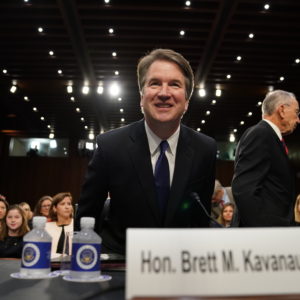Just hours after President Trump announced his pick of Brett Kavanaugh for the Supreme Court, Senate Minority Leader Chuck Schumer took to the floor to denounce the choice because Trump picked him “from a list of 25 people who were vetted and approved by the Federalist Society.”
Soon after, New Jersey Democrat Sen. Bob Melendez joined in: “I cannot support a nominee culled from the rightwing wish lists of the Federalist Society.”
During the Senate Judiciary Committee’s first day of hearings on Kavanaugh’s nomination, Sheldon Whitehouse (D-RI) said the Federalist Society had recommended his nomination, as they had that of Neil Gorsuch. “That should give every senator pause,” Whitehouse said.
All of which has inspired many Americans to ask: What the heck is the Federalist Society?
Far from being a semi-secret society conspiring against the U.S. justice system, the Federalist Society is actually a high-profile organization comprised of some 68,000 conservative and libertarian law students, attorneys, and academics. Founded in 1982 by students at the law schools of Harvard, Yale, and University of Chicago, it now boasts student chapters at more than 200 law schools and an additional 60-plus lawyer chapters in 80 cities around the country.
What is it about the Federalist Society that makes Senate Democrats “pause?” The organization has grown into an important networking tool for promoting the careers of rising young attorneys and jurists who share its “originalist” view of the Constitution. (Originalism is the belief that the Constitution should be applied based on the original understanding of the text at the time the Constitution was written or amended, as opposed to a “living document” whose meaning comes from the context of the moment.)
The Federalist Society’s success advancing the originalist legal theory has been nothing short of dramatic. Berkeley law professor John Yoo, a former Bush DOJ official, recently said: “When Antonin Scalia first joined the Supreme Court, originalism was a laughingstock at elite law schools. By the time of his death, any elite school that didn’t have at least two or three serious originalists on its faculty was itself a laughingstock.”
And while the organization’s successes are relatively recent, George Washington University law professor David Fontana notes that its ideas have been around for a while. “The idea of ‘originalism’ goes back at least as far as Chief Justice John Marshall’s opinions in the early 19th century,” Fontana wrote at the Daily Beast. “Justice Hugo Black was known in the 20th century as a leading originalist.”
In other words, it’s part of the legitimate and healthy debate over how America’s judges should approach and apply the law. But these mundane facts haven’t stopped Senate Democrats portraying the Federalist Society as some dark and dangerous force from the fringe of American jurisprudence.
The last time the Senate considered filling a vacancy on the high court (with Neil Gorsuch’s nomination in 2017), Senator Whitehouse demanded the Judiciary Committee hand over any and all documents related to the Federalist Society’s executive director. Whitehouse and fellow Democratic Senator Dick Durbin even attacked the organization as a kind of judicial Svengali seducing a willing President Trump into doing its bidding.
But claims that it’s a “shadow group” secretly pulling strings behind the scenes just don’t hold up. Far from on the fringe, every justice currently sitting on the nation’s highest court has spoken at Federalist Society events, including liberal icon, Justice Ruth Bader Ginsburg.
And it doesn’t stop there. The Federalist Society’s student branch held its national jamboree in February 2005 at Harvard Law School. According to attendees, then Harvard dean—and future Supreme Court justice—Elena Kagan began her welcoming remarks by roaring in her famous New York accent, “I love the Federalist Society!”
She went on to add, “You are not my people,” which drew a big laugh and a loud ovation. While Kagan reminded the group that she and they disagreed philosophically, at no point did she scold it for trying to secretly hijack our nation’ judicial system.
Republican senators have been critical of the performance of the Democratic counterparts during the committee hearings on Kavanaugh’s nomination. Sen. Lindsey Graham, for example, objected to characterizing the hearings as a “circus” because, he said, “that’s unfair to circuses. Circuses are entertaining and you can take your children to them.” The most common explanation for the Democrats’ performance is that Kavanaugh is such a strong nominee that they’re forced to resort to theatrics, rather than questioning his resume.
Far from believing he is outside the judicial mainstream, the American Bar Association said Kavanaugh is “unanimously well qualified” for the Supreme Court.
None of this explains Democrats’ attacks on the Federalist Society, or their suggestion that the organization’s recommendations of judges is somehow suspect. Perhaps they’re aware that, the same week Washington was obsessed with the Kavanaugh “circus,” the GOP-controlled Senate confirmed President Trump’s 68th judicial nominee.
All of whom had the support of the Federalist Society.
A vote is expected to confirm Kavanaugh to the Court later this month, and after a week of hearings, analysts widely expect him to win the Senate’s approval, as no missteps were made.

